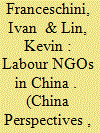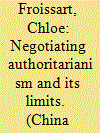| Srl | Item |
| 1 |
ID:
169210


|
|
|
|
|
| Summary/Abstract |
Since their appearance in the mid-1990s, Chinese labour NGOs have mostly focused on disseminating labour law and guiding labour disputes through official channels. In so doing, they have assisted the Chinese Communist Party in achieving its paramount goal of maintaining social stability. In line with this approach, activists in these organizations have traditionally framed their work in terms of “public interest” or “legality,” both of which resonate with the hegemonic discourses of the Party-state. However, earlier this decade a minority of Chinese labour activists began to employ some new counterhegemonic narratives centred on the experience of the labour movement and the practice of collective bargaining that attempted to recode the proletarian experience outside of its official representation. In this paper we analyze this discursive shift through the voices of the activists involved, and argue that the rise of these new counterhegemonic voices was one of the reasons that led to the Party-state cracking down on labour NGOs.
|
|
|
|
|
|
|
|
|
|
|
|
|
|
|
|
| 2 |
ID:
166100


|
|
|
|
|
| Summary/Abstract |
Since their appearance in the mid-1990s, Chinese labour NGOs have mostly focused on three kinds of activities: establishing workers’ centres; carrying out outreach programs on labour rights; and conducting social surveys and policy advocacy. Some scholars have strongly criticised this approach, considering it excessively unbalanced towards an individualistic and narrowly legalistic view of labour rights and thus in line with the political agenda of the Party-state. Still, in the past few years, as labour conflict intensified, a handful of labour NGOs have moved forward to adopt a more militant strategy focussed on collective bargaining and direct intervention into worker collective struggles. Based on dozens of interviews with labour activists and workers and detailed analysis of two case studies of NGO-fostered collective labour mobilisation in Southern China in 2014-2015, this paper will outline the personal and political reasons that motivated these organisations to move beyond a narrow legalistic approach and turn towards collective struggles. It will also describe the strategies that Chinese labour activists have adopted in dealing with collective cases. We will conclude by examining the main challenges that labour activists in China have to face when dealing with labour unrest and by questioning the sustainability and feasibility of this new approach in the current political climate.
|
|
|
|
|
|
|
|
|
|
|
|
|
|
|
|
| 3 |
ID:
158261


|
|
|
|
|
| Summary/Abstract |
Contrary to some scholars’ assertions, worker-led collective bargaining has become a practical reality in China, especially as seen in Guangdong Province between 2011 and 2015. This article analyses the practices and strategies of negotiation to show how this is possible in a regime that recognizes neither independent trade unions nor the right to strike. Labour NGOs have become a catalyst for collective action that enables workers to change the power balance with employers, official unions and local authorities and alter their response to labour conflicts. This article thus challenges the concept of ‘bargained authoritarianism’ by stressing social actors’ ability to carve out a space for negotiating authoritarianism despite obvious limits and tightening political constraints. However, collective bargaining will remain ad hoc and localized as long as trade unions and local authorities refuse to strike a durable alliance with workers and labour NGOs.
|
|
|
|
|
|
|
|
|
|
|
|
|
|
|
|
| 4 |
ID:
142571


|
|
|
|
|
| Summary/Abstract |
Relations between the state and labour NGOs in China have been particularly fraught. In 2012, they took an interesting turn when some local governments made overtures to labour NGOs to cooperate in providing services to migrant workers. This article argues that this shift is part of a broader strategy of “welfarist incorporation” to redraw the social contract between state and labour. There are two key elements to this strategy: first, a relaxation of the registration regulations for social organizations, and second, governmental purchasing of services from social organizations. These overtures have both a state and market logic to maintain social control and stabilize relations of production.
|
|
|
|
|
|
|
|
|
|
|
|
|
|
|
|
| 5 |
ID:
168018


|
|
|
|
|
| Summary/Abstract |
This article analyses the way in which, since 2010, Chinese trade unions have been trying to find forms of authoritarian collective bargaining that allow them to advance workers’ interests without calling into question their belonging to the state apparatus. It compares the case of the Dalian Industrial Zone to that of the Shenzhen Pilot Zone in a bid to understand how the unions try to acquire effectiveness and legitimacy in the absence of any progress in terms of representation.
|
|
|
|
|
|
|
|
|
|
|
|
|
|
|
|